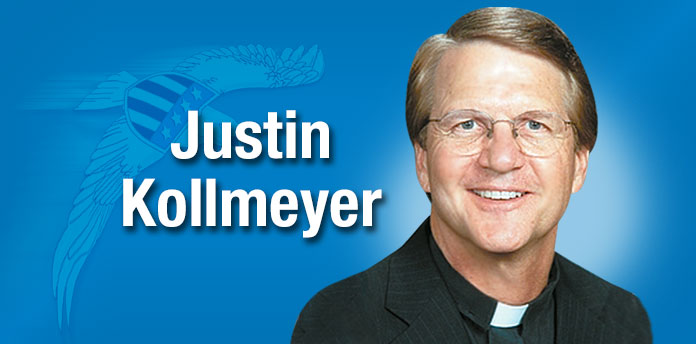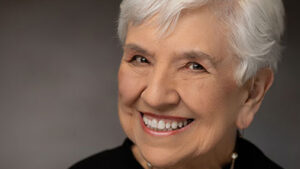Schools have this. Athletic teams have this. Golf courses have this. Certain clubs and organizations have this. A Dress Code. A description of what you should wear to properly represent a certain group of people. We’re all familiar with them.
On a Sunday morning not long ago, the well-known and respected preacher David Jeremiah preached a sermon on “The Christian’s Dress Code.” Maybe you saw it on television. In that sermon he gave interpretation to a Scripture passage which is fairly familiar to many of us.
He opened the Bible to Colossians 3:12-14 in the New Testament, a portion of a letter written by St. Paul to a congregation of people Paul knew quite well because he was their founding pastor.
Dr. Jeremiah called this portion of Paul’s letter “The Christian’s Dress Code,” as it begins with the simple call, “Put on then.”
I think it is helpful to print this short section here and then I will put some of Dr. Jeremiah’s thoughts into my own words.
“Put on then, as God’s chosen ones, holy and beloved, compassion, kindness, lowliness, meekness, and patience; forbearing one another and, if one has a complaint against another, forgiving each other; as the Lord has forgiven you, so you also must forgive. And above all these put on love, which binds everything together in perfect harmony.” Colossians 3:12-14
Here are my words to Dr. Jeremiah’s premises.
First of all, we belong to a group. This group is made up of all the people who identify with Jesus Christ, all the people acknowledging that we were dead in our sin and yet are now alive by the redeeming action of Jesus’ death on His cross and in His glorious resurrection from the dead. We are Christians. We are The Body of Christ. We are The Church, the invisible power of all who believe in Christ. We are, as St. Paul writes, “God’s chosen ones, holy and beloved.” (vs. 12)
St. Paul affirms this over and over in his letters which comprise so much of the New Testament.
So, what does Paul declare about this group, about the believers in the city of Colossae, and now about us? He declares the very message from God Himself. He declares that we have a “Dress Code.” He declares that we are to “put on” outward “apparel” that will show the world that we represent this sacred group of which we are a part.
I believe this “Dress Code” has been important throughout the history of the Church. But I truly believe that it is even more important, vitally important, in the days in which we now live.
How can we show the world that in Christ our group is different from the world around us? How can we represent the good and gracious Will of God in our fallen and now even more fractured world? How can we change the world for the better? How can we draw others into this wonderful reality of life now and even in eternity?
The answer is that we can, by the power of God’s Holy Spirit, treat one another and go out into the world “dressed” in alignment with God’s Dress Code.
So, what are the distinctive pieces of “apparel” that will mark us and empower us? What is our “Christian’s Dress Code?”
I will quote St. Paul and give a very brief definition. (You can find Dr. Jeremiah’s sermon on his Turning Point Ministry website to get a much more detail.)
St. Paul says to put on compassion. Compassion is the sympathetic (joining our feelings to that of the other person) concern for the sufferings and misfortunes of others. We Christians are great at this in our response to natural disasters, and we are often the last ones to leave hurting people long after the hype and publicity. The question is do we show compassion to those who differ so profoundly from us? Do we show compassion to those with whom we so significantly disagree?
Kindness is the next simple article of our “clothing.” However simple this may seem, it may be the thing that is most lacking in our world today. We are so divided and want to show kindness only to the ones on “our side.” It appears to me that so much of our divisions are caused by loud voices and influencers who call for division and plant seeds of disunity. Maybe our kindness could even influence these ones to soften toward unity.
St. Paul calls for lowliness, which is the opposite of the pride of self and self-centered action. Lowliness is our “servant uniform.” Our greatest example is Jesus Himself, who came not to be served, but to serve. (Matthew 20:28) As Jesus humbled Himself, we Christians are called to humble ourselves to the needs of all those around us. This includes our most immediate family members, our circles of activity, our community, those whom we know, and when possible those whom we might not know but only meet in a moment of opportunity.
Meekness is part of our Dress Code as well. Dr. Jeremiah says that when we hear this we immediately think of weakness, but he goes on to say that the only similarity between meekness and weakness is that they rhyme. However, in the Bible, he says, only two people are known for their meekness, Jesus and Moses, and they both were quite the opposite of weak. They both were courageous and strong and proved it over and over. What meekness does is give credit to another, and Jesus and Moses both gave all credit and glory to God. This is the strength of meekness. Shall we? Oh yes!
Next is patience which is giving honor to the timing of others. Sometimes this is with people, and all the time this is with God. It looks really good on us. Please refrain from saying, “Dear Lord, give me patience. Right now!”
Forbearing now gets put on. Forbearing is going the extra mile, giving second chances, working on problems together, compromising when at all possible, loving the other so much as to never give up on them. Think of your world full of forbearance. How beautiful would that be?
Maybe the outer garment that makes the biggest statement about our representation of Christ is that of forgiveness. Of course, God leads the way in forgiveness, as God the Father sent His Only Son Jesus to come and be the sacrifice to forgive all sin, all our sins. This is the tuxedo, the formal dress, the epitome of a well-dressed Christian, when we simply show the world, “forgive us our trespasses as we forgive those who trespass against us.” Amen!
Finally, there are the jewels of our Dress Code. The diamonds, the pearls, the gold, the silver, the engraved cufflinks. What is this in our Dress Code? St. Paul says, “Above all these put on love, which binds everything together in perfect harmony.” (vs. 14) And this love is God’s kind of love. It is freely given. It is undeserved. Jesus said after He had washed His disciples’ feet, “Love others as I have loved you.” This is what our Christian appearance brings to all those around us.
So there it is. Bless you, St. Paul, for your divinely inspired “Dress Code” description. Thank you, Dr. Jeremiah, for your keen insights. And most of all, Thank You, O God, for making us your children and dressing us so we can represent You and make the world a better place. Help us, O God, in this. Amen!
[Kollmeyer, a Fayette County resident for 36 years, is Pastor Emeritus at Prince of Peace Lutheran Church in Fayetteville. Follow Pastor Scott Ness and this great church at www.princeofpeacefayette.org. Kollmeyer until recently was Interim Pastor at Word of God Lutheran Church in Sharpsburg. Find some of his video recorded sermons at www.woglutheran.org and follow Pastor Jason Dampier and this great church on this site.]












Leave a Comment
You must be logged in to post a comment.